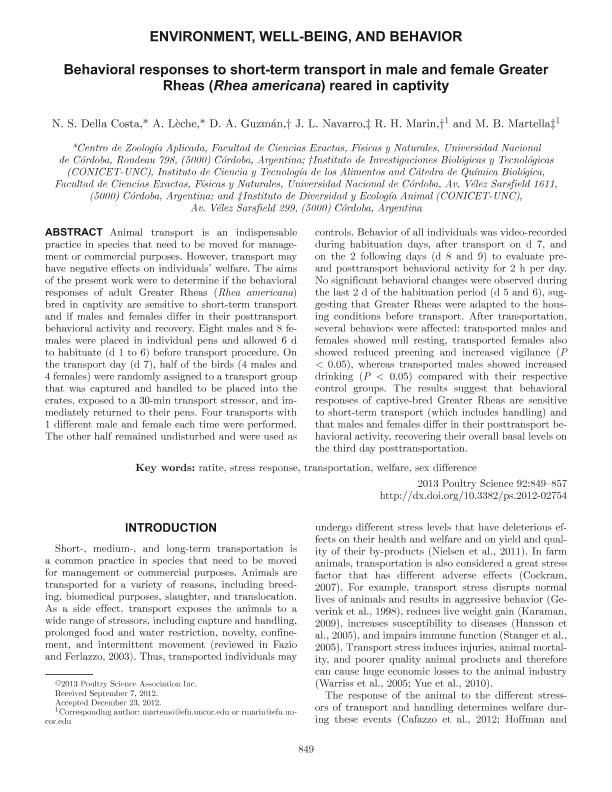Mostrar el registro sencillo del ítem
dc.contributor.author
Della Costa, Natalia Soledad

dc.contributor.author
Leche, Alvina

dc.contributor.author
Guzmán, Diego Alberto

dc.contributor.author
Navarro, Joaquin Luis

dc.contributor.author
Marin, Raul Hector

dc.contributor.author
Martella, Monica Beatriz

dc.date.available
2017-01-19T19:17:45Z
dc.date.issued
2013-04
dc.identifier.citation
Della Costa, Natalia Soledad; Leche, Alvina; Guzmán, Diego Alberto; Navarro, Joaquin Luis; Marin, Raul Hector; et al.; Behavioral responses to short-term transport in male and female Greater rheas (Rhea 7 americana) reared in captivity; Poultry Science Assoc Inc; Poultry Science; 92; 4; 4-2013; 849-857
dc.identifier.issn
0032-5791
dc.identifier.uri
http://hdl.handle.net/11336/11635
dc.description.abstract
Animal transport is an indispensable practice in species that need to be moved for<br />management or commercial purposes. However, transport may have negative effects on individuals? welfare. The aims of the present work were to determine if the behavioral responses of adult Greater rheas (Rhea americana) bred in captivity are sensitive to short-term transport and if males and females differ in their post-transport behavioral activity and recovery. Eight males and eight females were placed in individual pens and allowed 6 days to habituate (Days 1-6) before transport procedure. On the transport day (Day 7), half of the animals (four males and four females) were randomly assigned to a transport group that was captured and handled to be placed into the crates, exposed to a 30-min transport stressor and immediately returned to their pens. Four transports with 1 different male and female each time were performed. The other half remained undisturbed and was used as control. Behavior of all individuals was video-recorded during habituation days, after transport on Day 7 and on the two following days (Days 8 and 9) to evaluate pre- and post-transport behavioral activity for 2 hours per day. No significant behavioral changes were observed during the last two days of the habituation period (Days 5 and 6), suggesting that Greater rheas were adapted to the housing conditions before transport. After transportation, several behaviors were affected: transported males and females showed null resting, transported females also showed reduced preening and increased vigilance (P < 0.05), whereas transported males showed increased drinking (P < 0.05), compared to their respective control groups. The results suggest that behavioral responses of captive-bred Greater rheas are sensitive to short-term transport (which includes handling) and that male and female differ in their post-transport behavioral activity, recovering their overall basal levels on the third day post-transportation.
dc.format
application/pdf
dc.language.iso
eng
dc.publisher
Poultry Science Assoc Inc

dc.rights
info:eu-repo/semantics/openAccess
dc.rights.uri
https://creativecommons.org/licenses/by-nc-nd/2.5/ar/
dc.subject
Ratite
dc.subject
Stress Response
dc.subject
Transportation
dc.subject
Welfare
dc.subject
Sex Difference
dc.subject.classification
Otras Ciencias Veterinarias

dc.subject.classification
Ciencias Veterinarias

dc.subject.classification
CIENCIAS AGRÍCOLAS

dc.title
Behavioral responses to short-term transport in male and female Greater rheas (Rhea 7 americana) reared in captivity
dc.type
info:eu-repo/semantics/article
dc.type
info:ar-repo/semantics/artículo
dc.type
info:eu-repo/semantics/publishedVersion
dc.date.updated
2016-11-03T19:15:07Z
dc.journal.volume
92
dc.journal.number
4
dc.journal.pagination
849-857
dc.journal.pais
Estados Unidos

dc.description.fil
Fil: Della Costa, Natalia Soledad. Universidad Nacional de Cordoba. Facultad de Cs.exactas Fisicas y Naturales. Centro de Zoologia Aplicada; Argentina. Consejo Nacional de Investigaciones Científicas y Técnicas; Argentina
dc.description.fil
Fil: Leche, Alvina. Universidad Nacional de Cordoba. Facultad de Cs.exactas Fisicas y Naturales. Centro de Zoologia Aplicada; Argentina. Consejo Nacional de Investigaciones Científicas y Técnicas; Argentina
dc.description.fil
Fil: Guzmán, Diego Alberto. Consejo Nacional de Investigaciones Científicas y Técnicas. Centro Científico Tecnológico Córdoba. Instituto de Investigaciones Biológicas y Tecnológicas; Argentina
dc.description.fil
Fil: Navarro, Joaquin Luis. Consejo Nacional de Investigaciones Cientificas y Tecnicas. Centro Cientifico Tecnologico Cordoba. Instituto de Diversidad y Ecologia Animal; Argentina
dc.description.fil
Fil: Marin, Raul Hector. Consejo Nacional de Investigaciones Científicas y Técnicas. Centro Científico Tecnológico Córdoba. Instituto de Investigaciones Biológicas y Tecnológicas; Argentina
dc.description.fil
Fil: Martella, Monica Beatriz. Consejo Nacional de Investigaciones Cientificas y Tecnicas. Centro Cientifico Tecnologico Cordoba. Instituto de Diversidad y Ecologia Animal; Argentina
dc.journal.title
Poultry Science

dc.relation.alternativeid
info:eu-repo/semantics/altIdentifier/url/https://academic.oup.com/ps/article-lookup/doi/10.3382/ps.2012-02754
dc.relation.alternativeid
info:eu-repo/semantics/altIdentifier/doi/https://doi.org/10.3382/ps.2012-02754
Archivos asociados
